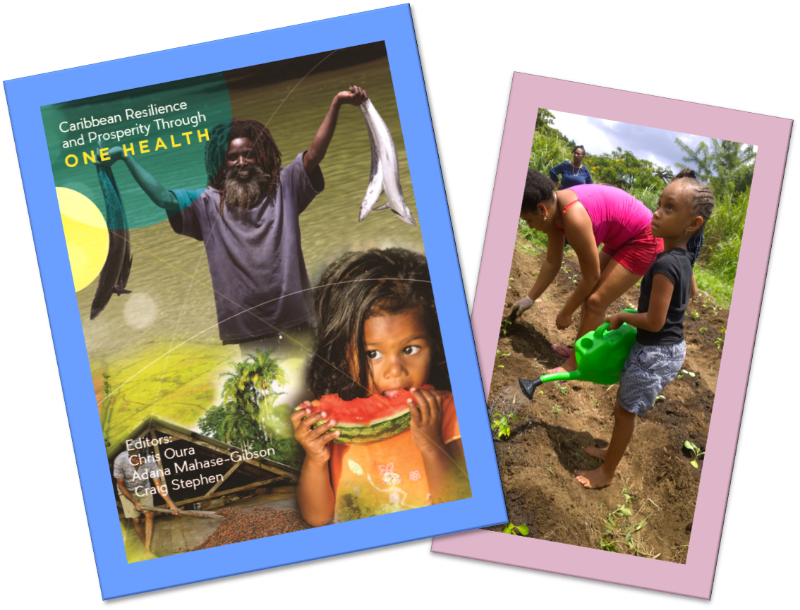"Caribbean Resilience and Prosperity through One Health" - Book review
By Tariku Jibat Beyene and Sammi Boyajian
Editors/Contributors: Chris Oura, Adana Mahase-Gibson, Craig Stephen

The book, "Caribbean Resilience and Prosperity through One Health", delivers a fascinating account of One Health in action in the Caribbean region. More than 30 experts from across the Americas contributed to the content, representing a multidisciplinary team of veterinarians, project managers, medical officers, environmental scientists, and other scientists involved in human and animal diseases, wildlife, and environmental protection. Of the three editors, Chris Oura is a professor of veterinary virology, and Adana Mahase-Gibson is a project manager, both at the University of the West Indies in Trinidad and Tobago. Craig Stephen is the Chief Executive Officer of the Canadian Wildlife Health Cooperative, with considerable experience in the area of wildlife health and protection.
In this book, authors define the purpose of One Health as "finding sustainable solutions to interconnected health problems involving people, animals, and the environment through partnerships and cooperation across sectors". Unlike other One Health publications, the content demonstrates evidence for One Health in action implemented across the Caribbean region. They describe how teams of trained One Health leaders in 12 Caribbean nations have developed country-specific projects, advocating the use a One Health approach to address a particular health issue at the interface between human, animal, and environmental health. They explain the advantages of following a One Health approach, rather than a single discipline approach, providing concrete examples that lead toward increased public awareness, fewer unintended consequences, improved resilience, and inspired timely action. They also stress the need for and the benefits of following a One Health approach to address interconnected problems that affect the Caribbean region, such as climate change (e.g., risk of rising sea-levels), food and nutritional security (e.g., poor access to nutritional foods), non-communicable diseases (e.g., as a result of shifted eating habits), infectious diseases and related pathogens (e.g., antimicrobial resistance), and economic growth. Moreover, this One Health approach, in turn, can facilitate global achievement of the 17 Sustainable Development Goals, set by the United Nations, toward ending poverty, protecting the planet, and ensuring universal prosperity.
Since health issues are not restricted to geographic borders, these described One Health projects can be successfully duplicated across other nations. One case study in St. Lucia, using the theme of "Combating Mosquitoes and Poor Nutrition", addressed inadequate nutrition in school-age children, challenges in solid waste management, and increasing incidence of vector-borne diseases. Hence, these connected problems were solved through connected solutions, concluding a One Health success story in St. Lucia.
This book serves as an academic resource for students and researchers, using case studies to showcase the One Health approach when addressing health challenges at the human-animal-environment interface. It can guide scientists and practitioners in their implementation of community-based One Health projects. Likewise, it may allow other stakeholders, like policymakers and funding agencies, to understand the multiple benefits of integrating the One Health approach.
As this publication complements the scientific literature, focusing on the Caribbean region, it motivates continued international dialogue toward accepting the One Health approach by policymakers and establishing metrics to determine project success. Using the One Health approach of implementing animal, human, and environmental projects can result in national and international success stories. These stories can then be quantified in metrics appealing to policy makers, including number of lives saved, reduced obesity in school-age children, decreased incidence of vector-borne disease in local communities, reduced environmental contamination with plastics, and reduced heavy metal contamination in fish.
Citation
Authors
Tariku Jibat Beyene, Ph.D.
Post-Doctoral Associate
College of Veterinary Medicine
Kansas State University
Sammi Boyajian
DVM Student, Class of 2019
College of Veterinary Medicine
Kansas State University
Contributor
Chris Oura
Professor in Veterinary Virology
Faculty of Medical Sciences
University of the West Indies
K-State Olathe
22201 W. Innovation Dr.
Olathe, KS 66061-1304
913-541-1220
913-541-1488 fax
olatheinfo@k-state.edu